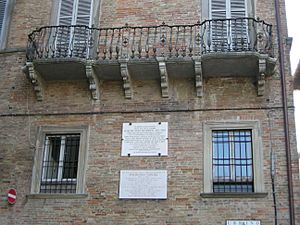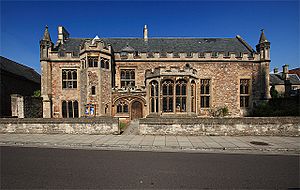Polydore Vergil facts for kids
Quick facts for kids
Polydore Vergil
|
|
|---|---|
| Born | c. 1470 Urbino, Duchy of Urbino
|
| Died | 18 April 1555 (aged 84–85) Urbino, Duchy of Urbino
|
| Resting place | Duomo di Urbino (cathedral) |
| Nationality | Urbinate; naturalised English 1510 |
| Other names | Polidoro Virgili |
| Occupation | Historian, scholar, diplomat, priest |
Polydore Vergil (born around 1470 – died 18 April 1555) was an Italian scholar, historian, priest, and diplomat. He spent most of his life in England. He is best known for his important books: Proverbiorum libellus (a collection of Latin proverbs), De inventoribus rerum (a history of discoveries), and the Anglica Historia (a history of England). Some people call him the "Father of English History".
Sometimes, old papers call him Polydore Vergil Castellensis. This might make it seem like he was related to his boss, Cardinal Adriano Castellesi. But it probably just meant he worked for the Cardinal.
Contents
Biography of Polydore Vergil
Early Life in Italy
Polydore Vergil was born around 1470. He was likely born in Fermignano or Urbino, both in the Duchy of Urbino, Italy. His father, Giorgio di Antonio, owned a shop that sold medicines. His grandfather, Antonio Virgili, was a smart man who taught philosophy at the University of Paris. Polydore's brother, Giovanni-Matteo, also taught at universities in Italy. Another brother, Girolamo, was a merchant who traded with England.
Polydore studied at the University of Padua. He became a priest by 1496. Before 1498, he probably worked for Guidobaldo da Montefeltro, the Duke of Urbino. He dedicated his first book, Proverbiorum Libellus, to the Duke. His second book, De Inventoribus Rerum, was for the Duke's teacher.
Before 1502, Polydore started working for Pope Alexander VI.
Moving to England
In 1502, Vergil moved to England. He was there to help Cardinal Adriano Castellesi collect money for the Pope. He also acted as the Cardinal's helper for other tasks. In 1508, he became the Archdeacon of Wells. He probably did not spend much time in Wells itself. Instead, he worked in London as a representative for the church. He also held other church jobs that paid him money, like in Lincoln and Hereford Cathedrals.
Because he was already a well-known writer and a scholar from the Italian Renaissance, people in England welcomed Vergil. King Henry VII was happy to have him at his court. The King even asked him to write a new history of England, called the Anglica Historia. He likely started this project around 1505.
In 1510, he officially became an English citizen.
In 1515, Vergil faced trouble. A letter he wrote was found by the authorities. It seemed to criticize King Henry VIII and his powerful advisor, Thomas Wolsey. Because of this, Vergil was put in the Tower of London in April. Important people, including Pope Leo X, wrote to the King to help him. Vergil was released before Christmas 1515.
Later Life and Death
Even though Vergil lived mostly in England, he visited Urbino several times. These visits were in 1513–14, 1516–17, and 1533–34. In 1534, the Duke of Urbino, Francesco Maria, made Vergil and his family nobles. This was to honor his writing achievements.
In 1546, Vergil gave up his church job in Wells. He probably planned to retire to Italy. He was allowed to return to Urbino in 1550. He likely left England for the last time in the summer of 1553. He died in Urbino on 18 April 1555.
Polydore Vergil's Important Books
Proverbiorum Libellus (Adagia)
Vergil's Proverbiorum Libellus was published in 1498. It was a collection of Latin proverbs, which are short, wise sayings. This was the first book of its kind to be printed. It came out two years before a similar book by Erasmus. At first, there was a disagreement between Vergil and Erasmus about whose book came first. But later, they became good friends.
The first edition of Vergil's book had 306 proverbs from old Roman and Greek writings. A second, larger edition came out in 1521. It included 431 proverbs from the Bible. This book was very popular and was printed about 20 times by 1550.
De Inventoribus Rerum
Vergil's De Inventoribus Rerum was published in 1499. He wrote it very quickly, in just three months. This book was a history of how things started and were invented. It described the "first creators" of many human activities. For example, it talked about the origins of gods, marriage, religion, and learning. It also covered the beginnings of laws, time, money, and art.
In 1521, Vergil added five more books to it. These new parts focused on the origins of Christian traditions and practices. This book was very popular and was quickly translated into French, German, English, and Spanish. It was printed in Latin about 70 times and translated about 35 times.
Anglica Historia
Vergil's most famous work in England was his history of England, the Anglica Historia. He started writing it around 1506 because King Henry VII asked him to. The first version was finished by 1513. However, it was not published until 1534.
Vergil used many different sources for his book. He read published books and listened to people's stories. He said he worked hard to collect information from both foreign and English historians. He even asked James IV of Scotland for a list of Scottish kings.
This book was very important for understanding English history from 1460 to 1537. It influenced later historians and even the history plays written by William Shakespeare.
One part of Vergil's book caused a lot of debate in England. He was doubtful about the traditional stories of early British history, especially about King Arthur. This upset some English scholars who believed in these stories. For example, John Leland strongly disagreed with Vergil's views on King Arthur.
Some English readers also got very angry at what they saw as criticisms of their national history. Some even accused Vergil of burning old English manuscripts. They claimed he did this to hide any mistakes in his own work. However, other scholars praised him. For example, William Burton called him "a man of singular invention, good judgement, and good reading."
Commemoration
Polydore Vergil was buried in Urbino Cathedral in Italy. He had helped pay for the St Andrew chapel there. A memorial stone was placed on his tomb in 1631. It said that his fame would "live for ever in the world." Sadly, this stone was lost when the cathedral was damaged by an earthquake in 1789.
Today, Vergil's family home in Urbino has a special sign. There is also a statue of him in the city, which was put up in 2000.
Images for kids
See also
 In Spanish: Polidoro Virgilio para niños
In Spanish: Polidoro Virgilio para niños
 | Victor J. Glover |
 | Yvonne Cagle |
 | Jeanette Epps |
 | Bernard A. Harris Jr. |





